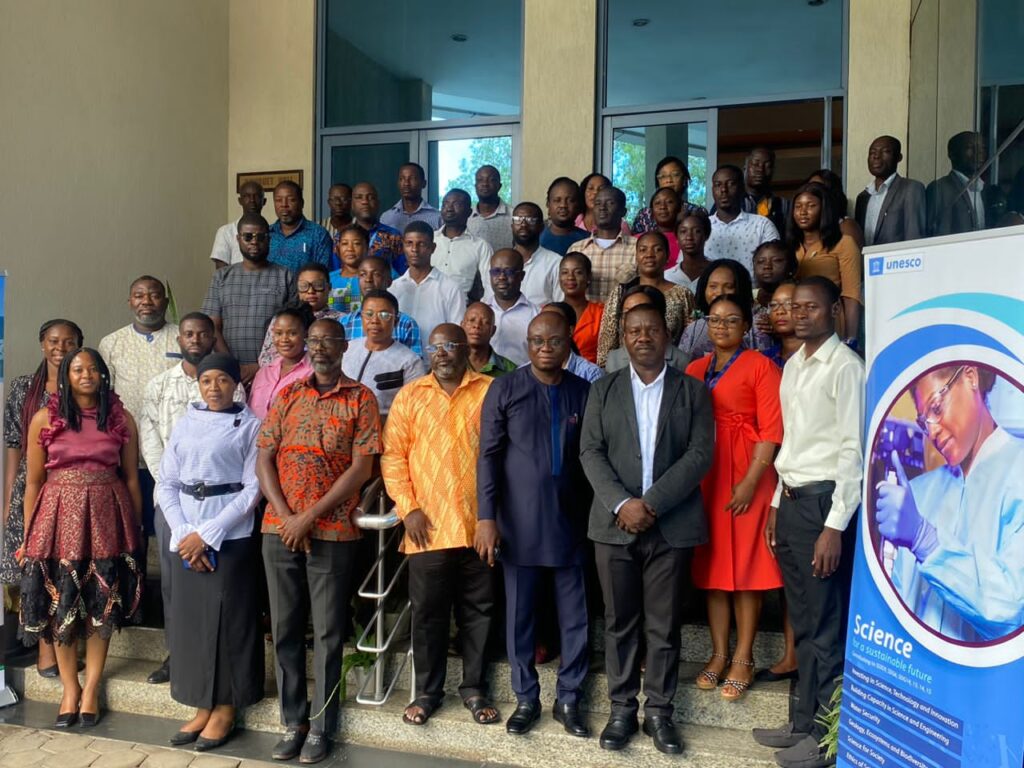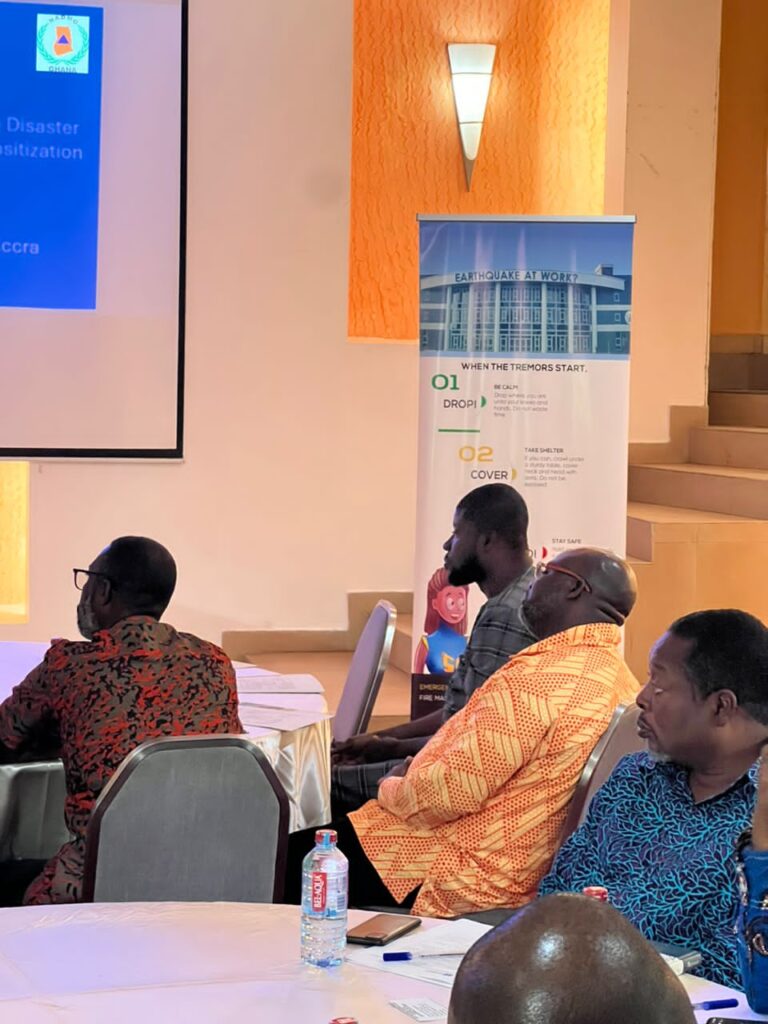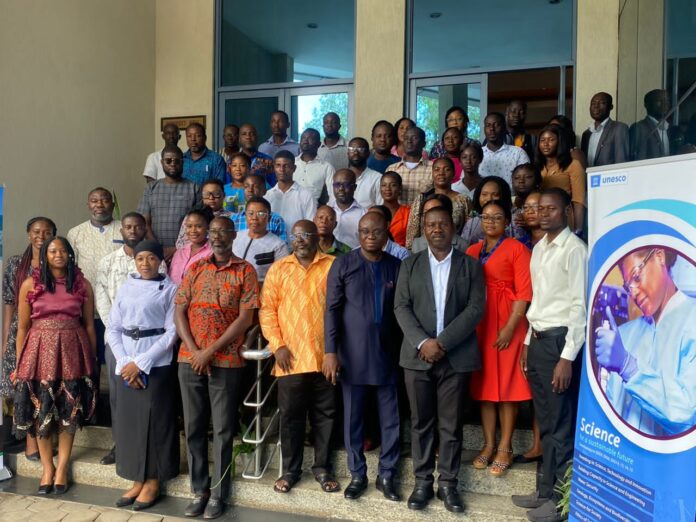The United Nations Educational, Scientific and Cultural Organization (UNESCO) has organised a training for stakeholders on Earthquake Disaster Risk Reduction Education and Sensitization.
The training held on Thursday, October 19,2023 was to enable participants understand Earthquake Science and Hazards and as well increase knowledge on what to do before, during, and after earthquakes.
The training will also enable NADMO staff to develop a sustainability module to continue education in the communities, thereby increasing community earthquake preparedness.
The participants were relevant Government officials from NADMO, Ministry of Interior and Ministry of Local Government, who are engaged in Disaster Risk Reduction functions.
Others were Disaster Management Officers working in earthquake-prone areas including Weija Gbawe, Ashiedu Keteke, Ablekuma South, Okaikwei South, Okaikwei North, Korle Klottey and Ablekuma West.
Aside from the above, the training will be sent to the Weija-Gbawe Community to sensitise residents on earthquake disaster risk reduction.
Read Also: Darling Lemon Amammere Hemaa: Naa Ode evicted

Speaking at the opening of the training, the Officer-in-Charge who spoke on behalf of UNESCO Representative to Ghana, Mr. Prosper Nyavor observed that the spate of disasters, both the natural and technologically induced ones, have significantly increased, and with them, devastating socio-economic impacts.
He noticed that in recent months, two disastrous events struck North Africa. First, a 6.8 magnitude earthquake devastated central Morocco. Second, torrential rains caused by Storm Daniel led two dams to collapse in northeast Libya, washing away entire towns and their heritage.
Right here at home, he observed that some parts of the country have been experiencing an increasing spate of high tidal waves due to climate change since 2018.
These high waves, Mr Nyavor noted, resulted in the flooding of some coastal communities in the Volta Region, also pointing to the spillage of excess water from the Akosombo and Kpong Dams, which has resulted in severe flooding in communities downstream in the Eastern and Volta Regions.

He was of the view that these impacts can be reduced through proactive measures and planning, hence the training.
“That is why UNESCO emphasizes pre-disaster action and supports capacity building for countries to manage disasters and climate risk. As an organization that operates at the interface between the natural and social sciences, education, culture and communication, UNESCO works across the board in advocating for risk awareness, prevention, preparedness, building back better, fostering learning and building capacity,” he said.
Mr. Prosper Nyavor stated that UNESCO and WFP have been collaborating to support the efforts of the Government of Ghana regarding immediate or short-term measures such as educating, sensitization, and raising awareness among the populace, especially the vulnerable, on earthquake risk reduction.
Through this collaboration, he noted that in October 2022, educational and sensitization materials such as fliers and posters on the earthquake disaster risk reduction theme were produced and donated to NADMO for community sensitization.
According to him, a 5-minute animation story with content based on the documented information on the 1939 earthquake in the 13th bulletin of the Gold Coast Geological Survey was also produced and has been broadcast by the National Television Station and on some private TV.
“Education and sensitization of children and the public, including evacuation drills, are essential for people to know what to do when an earthquake occurs or when an early warning is issued. This is imperative for disaster risk reduction. Therefore, UNESCO believes that apart from producing earthquake educational materials, a sustained public education and sensitization campaign, including earthquake evacuation drills in schools, workplaces, churches, mosques, markets, lorry parks, etc., should be undertaken, especially for people living in high-risk zones in Ghana,” he stated.
He was of the belief that there is still much more to be done collectively to ensure that Ghana gets the holistic capacity development needed to adequately prepare for an earthquake disaster or any other disaster.
He therefore encouraged all to explore how their individual added values as institutions can be brought on board to design effective interventions toward disaster risk reduction.
For his part, a Principal Seismologist at the Ghana Geological Survey Authority, Mr. Nicholas Opoku, noted that an Earthquake Committee constituted by the Ministry of Interior authored a document in December 2019 entitled “A Framework for Refocusing Ghana’s Earthquake Preparedness and Response.”
According to him, the Committee made over 60 recommendations assigned to specific organisations to help Ghana prepare for Earthquake Disaster Risk Reduction.
However, he complained that most of the organisations are not working with the recommendations.
He therefore called on all those organisations to start implementing the recommendations.
The Greater Accra Director for NADMO, Mr Al-Hassan Mahama also made it known that NADMO was under-resourced over relief items given to Ghanaians during or after they are hit with disasters.
He appealed to all, especially corporate entities to support the Organisation with more relief items including food, mattresses, mosquito nets, bed sheets and pillows so that they can support victims in such events.
Ghana| Atinkaonline.com| Porcia Oforiwaa Ofori




























